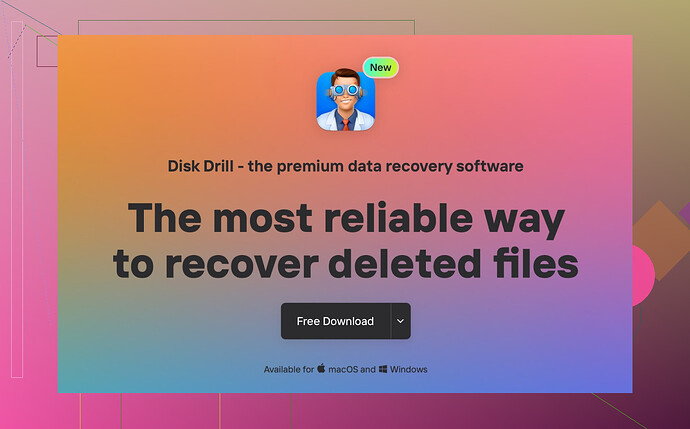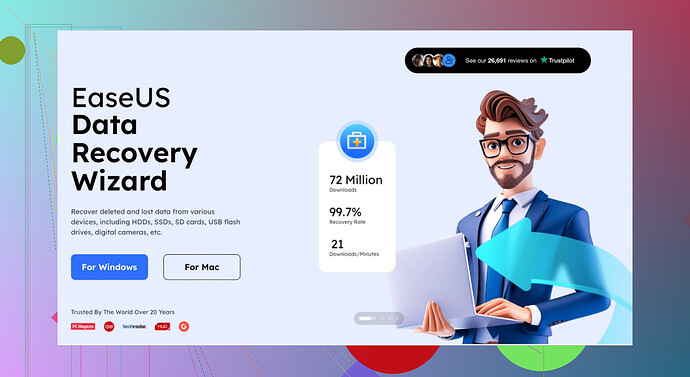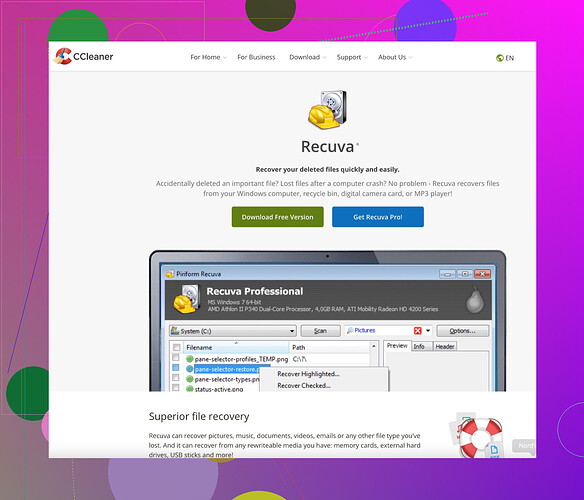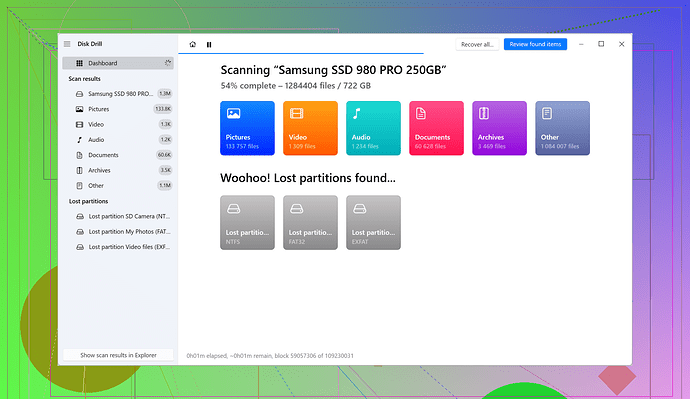My RAID setup crashed unexpectedly and I’m desperate to recover my data. Can anyone recommend reliable RAID recovery software that has worked for them? Data is extremely important, need solutions ASAP.
Top Data Recovery Software for Mac & Windows (Free & Paid Options)
Losing important files can be a nightmare, whether it results from accidental deletion, hard drive formatting, or system crashes. Fortunately, there are powerful data recovery tools designed to retrieve your lost files. Here’s a comprehensive guide to some of the best software available, covering free and paid solutions.
1. Disk Drill (Compatible with Mac and Windows)
Why Choose Disk Drill?
Disk Drill is a robust and intuitive tool that caters to beginners and professionals alike. With support for 400+ file formats and features such as Recovery Vault to prevent future data loss, it’s a standout solution.
 Pros:
Pros:
 Simplified interface for easy navigation.
Simplified interface for easy navigation. Capable of recovering over 400 file formats, from documents to videos.
Capable of recovering over 400 file formats, from documents to videos. Built-in tools like Recovery Vault for proactive protection.
Built-in tools like Recovery Vault for proactive protection. Free version retrieves up to 500MB of data on Windows.
Free version retrieves up to 500MB of data on Windows.
 Cons:
Cons:
 Free version on Mac only offers a preview feature, not actual recovery.
Free version on Mac only offers a preview feature, not actual recovery. Deep scans can take a significant amount of time.
Deep scans can take a significant amount of time. Full recovery requires upgrading to a paid version.
Full recovery requires upgrading to a paid version.
Verdict:
Disk Drill strikes the perfect balance between power and simplicity, offering exceptional trial features for both casual and professional users.
![]() Visit Disk Drill’s Official Site
Visit Disk Drill’s Official Site
![]() Detailed Discussion: Reddit Review of Disk Drill
Detailed Discussion: Reddit Review of Disk Drill
![]() Watch Guide on YouTube:
Watch Guide on YouTube: https://www.youtube.com/watch?v=IGEizr1WZ3E
2. EaseUS Data Recovery Wizard (Mac/Windows)
Why EaseUS Stands Out:
This tool is popular for its intuitive three-step process and AI-powered scanning capabilities. EaseUS is a go-to solution for everyday file retrieval.
 Pros:
Pros:
 Recovery involves just three easy steps—scan, preview, recover.
Recovery involves just three easy steps—scan, preview, recover. AI-integrated scanning for more profound data recovery.
AI-integrated scanning for more profound data recovery. Free version allows up to 2GB in recovery.
Free version allows up to 2GB in recovery. Supports RAW drives and lost partition recovery.
Supports RAW drives and lost partition recovery.
 Cons:
Cons:
 Free tier isn’t adequate for larger files.
Free tier isn’t adequate for larger files. Lengthy processing time for deep scans.
Lengthy processing time for deep scans. Full capabilities require purchasing a license.
Full capabilities require purchasing a license.
Verdict:
EaseUS is an excellent choice for casual users looking for fast and effective data recovery, especially for moderate file losses.
![]() Community Take: Explore Reddit Reviews
Community Take: Explore Reddit Reviews
3. Recuva (Windows Exclusive)
Perfect Free Solution:
Famed for offering truly free file recovery with unlimited capacity, Recuva is a lightweight yet efficient tool for most Windows users.
 Pros:
Pros:
 100% free for unlimited file recovery tasks.
100% free for unlimited file recovery tasks. Lightweight software with fast scanning capabilities.
Lightweight software with fast scanning capabilities. Available in a portable version—no installation needed.
Available in a portable version—no installation needed.
 Cons:
Cons:
 Not available for macOS users.
Not available for macOS users. Lacks advanced features for sophisticated recovery needs.
Lacks advanced features for sophisticated recovery needs. May struggle to retrieve heavily corrupted files.
May struggle to retrieve heavily corrupted files.
Verdict:
Though minimalistic, Recuva excels in providing free and speedy recovery features for users seeking simplicity.
![]() Community Insight: Are the Free Claims True? Find Out on Reddit
Community Insight: Are the Free Claims True? Find Out on Reddit
4. Stellar Data Recovery (Mac/Windows)
A Feature-Rich Tool:
With advanced recovery for specific media like photos, emails, and unresponsive drive data, Stellar is a professional-grade utility.
 Pros:
Pros:
 High success rate in recovering various media types, including photos and videos.
High success rate in recovering various media types, including photos and videos. Supports a diverse range of hardware, including USB drives and SD cards.
Supports a diverse range of hardware, including USB drives and SD cards. Free version enables recovery of up to 1GB of data.
Free version enables recovery of up to 1GB of data.
 Cons:
Cons:
 Free recovery is capped at 1GB.
Free recovery is capped at 1GB. Slower scanning speeds.
Slower scanning speeds. Higher-tier features require pricier licenses.
Higher-tier features require pricier licenses.
Verdict:
If you need robust features and powerful scanning capabilities for professional use, Stellar is a safe bet.
5. TestDisk & PhotoRec (Open-Source, Mac & Windows)
The Open-Source Underdog:
This free combination of command-line-based tools offers unparalleled partition recovery and deep-level data scans.
 Pros:
Pros:
 Absolutely free and open-source.
Absolutely free and open-source. Exceptionally effective for partition-level recovery.
Exceptionally effective for partition-level recovery. Compatible with multiple platforms, including Linux.
Compatible with multiple platforms, including Linux.
 Cons:
Cons:
 No graphical user interface—it’s entirely command-line-based.
No graphical user interface—it’s entirely command-line-based. Steep learning curve for beginners.
Steep learning curve for beginners.
Verdict:
TestDisk is a technical marvel reliable for advanced users and developers seeking precision in data recovery.
6. R-Studio (High-End Tool for Mac & Windows)
Why R-Studio Reigns:
R-Studio provides professional-caliber tools such as RAID recovery and network restoration for specialists in data recovery.
 Pros:
Pros:
 Advanced support for RAID and network-based data recovery.
Advanced support for RAID and network-based data recovery. Compatible with a wide range of file systems.
Compatible with a wide range of file systems. Designed for tackling the most complex cases.
Designed for tackling the most complex cases.
 Cons:
Cons:
 Complex, professional-grade interface not suitable for newcomers.
Complex, professional-grade interface not suitable for newcomers. Only available as a premium, paid software.
Only available as a premium, paid software.
Verdict:
Tailored for data recovery experts, R-Studio provides unmatched precision and versatility.
7. Wondershare Recoverit (Mac/Windows)
Recover Videos Like a Pro:
Wondershare Recoverit specializes in retrieving not just everyday files but also video files that are damaged or incomplete.
 Pros:
Pros:
 Effortless interface that welcomes beginners.
Effortless interface that welcomes beginners. Handles over 1,000 file types with ease.
Handles over 1,000 file types with ease. Especially great for video recovery and repair.
Especially great for video recovery and repair.
 Cons:
Cons:
 Free tier limited to 500MB of data.
Free tier limited to 500MB of data. Longer processing time for in-depth scans.
Longer processing time for in-depth scans.
Verdict:
Recoverit fits perfectly for beginners and creatives needing robust video recovery.
8. Ontrack EasyRecovery (Mac/Windows)
The Professional’s Choice:
Trusted by many IT experts, this software provides extensive recovery features, including specialized RAID and email recovery.
 Pros:
Pros:
 Excellent reputation among professionals.
Excellent reputation among professionals. Free version includes up to 1GB of data recovery.
Free version includes up to 1GB of data recovery. Offers unique capabilities like RAID repair in premium tiers.
Offers unique capabilities like RAID repair in premium tiers.
 Cons:
Cons:
 Free version limits individual file recovery to 25MB.
Free version limits individual file recovery to 25MB. Higher-grade features can cost a significant amount.
Higher-grade features can cost a significant amount.
Verdict:
Ontrack excels for mission-critical scenarios where reliability is paramount.
9. Prosoft Data Rescue (Mac/Windows)
A Mac Favorite:
Prosoft’s software is particularly known for its drive-cloning capabilities, making it ideal for severely damaged storage issues.
 Pros:
Pros:
 Strong recovery abilities tailored to Mac environments.
Strong recovery abilities tailored to Mac environments. Features a drive-cloning utility to bypass hardware failures.
Features a drive-cloning utility to bypass hardware failures.
 Cons:
Cons:
 Confusing ‘pay-per-recovery’ pricing model.
Confusing ‘pay-per-recovery’ pricing model. Lacks a lifetime licensing option.
Lacks a lifetime licensing option.
Verdict:
Prosoft is a strong contender for Mac users seeking advanced recovery features.
10. MiniTool Power Data Recovery (Windows Only)
A Simpler Option:
MiniTool targets quick recovery for small, simple situations, largely focusing on Windows users.
 Pros:
Pros:
 Easy to set up and use.
Easy to set up and use. Free version supports 1GB of data.
Free version supports 1GB of data.
 Cons:
Cons:
 Windows-only, meaning no macOS compatibility.
Windows-only, meaning no macOS compatibility. Suitable for minor recoveries, but not for advanced needs.
Suitable for minor recoveries, but not for advanced needs.
Verdict:
MiniTool is a basic but effective solution for small-scale data loss.
Final Recommendations
After evaluating these tools, here’s the breakdown of the top options for specific needs:
-
Best for Beginners:
Disk Drill, EaseUS, Wondershare Recoverit. -
Best Free Tools:
Recuva (Windows), TestDisk & PhotoRec (All Platforms). -
Best for Professionals:
R-Studio, Disk Drill, Prosoft Data Rescue, Ontrack. -
Best for Media Files (Videos):
Wondershare Recoverit, Disk Drill.
 Tip for All Users:
Tip for All Users:
Start with a free tool if your data loss is minor or uncomplicated. For deeper or more extensive recovery, consider upgrading to a professional-grade program.
If your RAID setup crashed, the stakes are high, and unfortunately, not every data recovery tool will handle RAID arrays effectively. While some good options were suggested by @mikeappsreviewer like R-Studio and Prosoft Data Rescue, here’s the harsh truth: RAID recovery usually isn’t a one-click solution, and you may have to invest time—and likely some cash—into resolving it.
From personal experience, Disk Drill is a solid pick. It has advanced recovery features for RAID configurations and supports numerous file systems, making it versatile. What’s great is its user-friendly interface, so you don’t need to be a tech wizard to use it. But yeah, you’ll need the paid version to get the full functionality for RAID recovery, so it’s more of a commitment.
That said, if you’re tech-savvy or okay rolling your sleeves up, TestDisk might be worth a shot—it’s open-source and free. The catch? Its command-line interface could be intimidating, and it doesn’t offer the bells and whistles of premium tools.
For cases like failed RAID 5 or complex corruption, R-Studio can dig deep and handle these scenarios professionally—it’s basically the gold standard for advanced users. Just prepare yourself for a less user-friendly design and a steep learning curve.
Honestly, you might also consider consulting a professional RAID recovery service if the data is ultra-critical and you’re hitting dead ends. They’ll cost you way more but have specialized gear for extreme cases.
Word of advice: don’t keep tinkering with it without a clear recovery strategy—it could mess things up even more. Start by cloning the drives, then let software like Disk Drill or R-Studio take a crack at it.
First of all, RAID recovery is no joke. If your RAID setup is really critical, don’t mess around too much with software—it could make things worse. That said, if you’re set on DIY recovery, here’s my take after dealing with a RAID nightmare myself.
You’ve already got some solid suggestions from @mikeappsreviewer and @sterrenkijker. I’ll second R-Studio for advanced recovery, particularly if you’ve got RAID 5 or any striped arrays involved. It’s a beast but not the friendliest tool. Think of it as the Swiss Army knife of RAID recovery software—tons of features but requires some patience and somewhat of a technical understanding. Yes, it’s pricey, and no, it isn’t beginner-friendly, but it can handle the heavy lifting most tools can’t.
Now, if you want a more user-friendly option, Disk Drill is a standout for RAID data recovery. The interface is straightforward, and it supports multiple file systems, making it versatile. Plus, it can help recover data before overlays or damage get worse. But keep in mind, their free version is limited—you’re gonna need the paid one for proper RAID recovery.
On the flipside, I’ll be the one to slightly disagree with TestDisk if you’re not tech-savvy. Sure, it’s free (big bonus), but the command-line-only setup can be intimidating unless you’re comfortable with terminal-based work. For anyone who isn’t, you’ll probably end up stuck, frustrated, and Googling ‘how the heck does TestDisk work?’ Trust me, been there.
If your setup is beyond saving with software—like a fried controller or multiple disk failures—you might need to swallow the painful truth and call a professional RAID recovery service. They’ll cost an arm and a leg, but at least they won’t botch it further.
Last tip: whatever you do, clone your disks before touching anything! You don’t want to overwrite recoverable data by accident.
Alright, here’s the lowdown: RAID recovery in DIY mode can be a blessing or a curse, depending on your approach and tool selection. While @sterrenkijker dropped a solid mention of TestDisk, I’d personally steer clear unless you’re comfortable navigating a terminal. It’s powerful but commands a steep learning curve—perfect for Linux-savvy folks but likely headache-inducing for casual users.
Now, for tools like R-Studio (as @vrijheidsvogel raved about), it’s amazing for complex RAID setups like RAID 5 and beyond. BUT it has a “pro-only” vibe, and it’ll test your patience and wallet. If you’re tech-oriented, dive in—but novices might drown in its myriad of options.
Seeing your desperation, let me throw Disk Drill into the mix—an easier-to-use alternative with advanced RAID recovery features wrapped up in a clean interface. Here’s why it deserves attention:
Pros of Disk Drill for RAID Recovery:
- Friendly user interface—less intimidating than R-Studio or TestDisk.
- Supports multiple file systems (NTFS, FAT, EXT4, etc.) and RAID types, so versatility isn’t a problem.
- Their Recovery Vault feature can help prevent future data loss.
- The Windows version’s free tier allows up to 500MB of recovery, which is enough to test compatibility without committing.
Cons for Disk Drill:
- Paid version is mandatory for full recovery, especially for RAID.
- Deep scans can take forever depending on your drive size (prepare a coffee).
- The Mac free version only teases you with a file preview (tease, not recover!).
Compared to @mikeappsreviewer’s nod to EaseUS, Disk Drill has a sharper RAID focus, though EaseUS shines for quick, intuitive recovery tasks. Between the two, I’d go with Disk Drill if RAID is your biggest concern, but EaseUS works for simpler setups.
Now, MY extra unique advice? Don’t forget the basics: clone those drives first!! Use free imaging tools like Clonezilla if you can. That way, if your software attempt messes up, you still have untouched disk images to hand over to a pro recovery service.
In conclusion, Disk Drill is your friendly middle ground—not as hardcore as R-Studio, not as daunting as TestDisk. But weigh the cost of software vs. a professional lab carefully—especially with RAID arrays.



